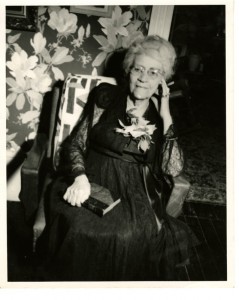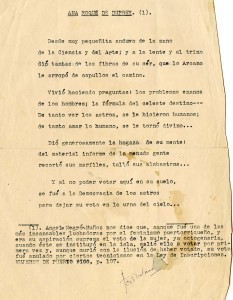Trina Padilla de Sanz: A Woman Ahead of Her Time
by Carly Miller, curator
Currently on display through September 20th at the Msgr. William Noé Field Archives & Special Collections Reading Room are items from the Trina Padilla de Sanz papers (Mss 0020). The exhibit showcases published works by the Puerto Rican writer, poet, composer, and social activist Trina Padilla de Sanz (1864-1957).

Writing as La Hija del Caribe, Padilla de Sanz was a prominent literary figure in the twentieth century, penning numerous articles, poems, and essays on a wide variety of topics such as history, literature, poetry, music, politics and culture. In a period when expectations for women were mostly confined to the domestic sphere, Padilla de Sanz represents an important deviation from the norm. Breaking free of society’s narrow view of a woman’s place in the world, Padilla de Sanz was an outspoken, unrelenting voice for change.
This exhibit focuses on one very prominent aspect of La Hija’s writings: her activism. She focused on progressive topics such as women’s rights, the preservation of the Puerto Rican culture and identity, and protection and compassion for those most often marginalized and ignored. La Hija’s feminism, patriotism, and drive for social justice are represented in the displayed works. From advocating for compassion on behalf of the incarcerated to calling out the United States for its aggression to highlighting women’s role in wartime, Padilla de Sanz did not shy away from controversial topics.

While the exhibit represents only a small portion of her extensive writing career, it fittingly demonstrates the essence of Padilla de Sanz. Her desire to see society improve formed not only the basis of her writings but also of her life. La Hija was actively involved in community affairs so that she could encourage the type of change that she so often wrote about in newspapers and magazines. Not content to sit on the sidelines, Padilla de Sanz unabashedly ignored the societal expectation of women in the twentieth century. Instead, she carved out a diverse and fulfilling career. She was a woman ahead of her time, paving the way for future generations of women and inspiring progress and reform within society.
For more information about this exhibit or to make an appointment to view the Trina Padilla de Sanz papers, please contact 973-761-9476 or archives@shu.edu.